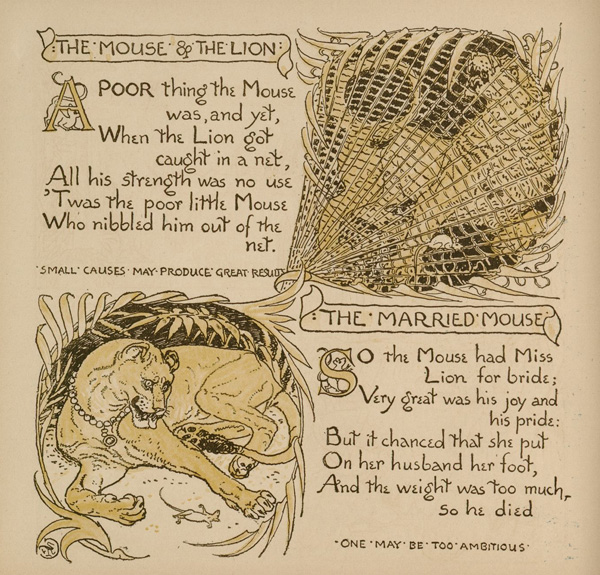121. Of the Tanner Buying the Skin of a Bear Not Yet Taken by the Huntsman
The tanner coming to the hunter bought the skin of a bear of him and proffered money for it. He said that he had not the skin of a bear at present, but the day after he should go to hunt and, the bear being killed, he promises that he would give the skin of it to him. The tanner having gone into the wood, ascends a very high tree that thence he might behold the engagement of the bear and the hunter. The hunter, unaffrighted, having gone to the cave where the bear lay hid, the dogs being sent in, forced him to go out who, the blow of the hunter being avoided, beat him to the ground. Then the hunter, knowing this beast did not rage on carcasses, his breath being held, feigned himself dead. The bear, smelling, when he held him neither breathing at the nose nor mouth, went away. The tanner, when he perceived the beast to be gone and that there was nothing more of danger, letting down himself out of the tree and coming to the hunter, who dared not yet to arise, advised him that he should arise; then he asked what the bear had spoke to him in his ear. To whom the hunter said, "He warned me that I should not be willing hereafter to sell the skin of a bear unless I first shall have taken him."
Moral. This fable shows that uncertain things are not to be accounted for certain.
122. Of the Hermit and the Soldier
A certain hermit, a man of most holy life, advised a soldier that, secular warfare being left, which few exercise without offense of God and hazard of life, at length he would give himself to quiet of body and would consult for safety of soul. To whom the soldier said, "Father, I will do what you advise, for it is true that at this time soldiers neither dare to ask pay, although it be small, nor to plunder."
Moral. This fable shows that many renounce vices because they are not able to exercise them longer.
123. Of the Man and Wife Twice Married
A certain man, his wife being dead, whom he very much had loved, married another, and her, a widow, who daily objected to him the virtues and valiant deeds of her former husband, to whom, that he might return the like, he also related the most approved morals and remarkable modesty of his dead wife. But on a certain day, being angry with her husband, she gave part of a capon which she had cooked for the supper of each to a poor man asking an alms, saying, "I give this to thee for the soul of my former husband," which, the husband hearing, the poor man being called by him, gave the rest of the capon to him, saying, "And I also give this to thee for the soul of my departed wife." Thus they, whilst one desires to hurt the other, at length had not what they might sup on.
Moral. This fable advises that it is not to be fought against those who are able to revenge themselves very well.
124. Of the Lion and the Mouse
The lion, taken in a snare in the wood, when he saw himself so entangled that he was not able to extricate himself thence, asked the mouse that, the snare being gnawed by him, he would free him, promising that he would not be unmindful of so great a benefit, which, when the mouse had done readily, he asked the lion, that he would give him his daughter to him to wife. The lion refused not that he might do a thing grateful to his benefactor. But the new married lady coming to the husband, when she did not see him, by chance pressed him with her foot and trod him to pieces.
Moral. The fable shows that marriages and other fellowships are to be condemned which are contracted by unequals.

125. Of the Elm and the Osier
The elm, born on the bank of a river, laughed at the osier next to him as weak and infirm, because it would be bent at every, even the lightest force of the waters, but she extolled her own steadiness and strength with magnificent words because, unshook, she had bore the daily attacks of the river many years. But the elm at last being broken by the very great violence of the waters was drawn along by the waters, to which the osier, laughing, said, "Neighbor, why dost thou forsake me? Where now is thy fortitude?"
Moral. The fable showeth those to be more wise who yield to the more powerful than they who, willing to resist, are overcome basely.
No comments:
Post a Comment
Comments are limited to Google accounts. You can also email me at laurakgibbs@gmail.com or find me at Twitter, @OnlineCrsLady.